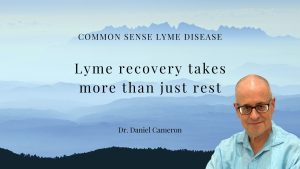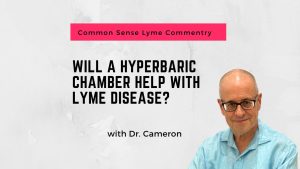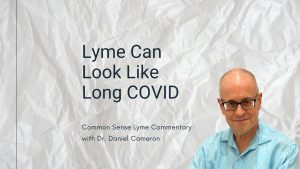Call for your appointment today 914-666-4665 | Mt. Kisco, New York

The case involved a 46-year-old man with Lyme disease who presented to the clinic with cardiac complications, which initially manifest as palpitations.
The patient lived in a Lyme endemic region and reported that one month earlier, he had a “pinching sensation in his right thigh with an associated macular erythematous rash,” according to the authors. He did not notice a tick bite.
The man later developed high fevers, fatigue, and a second rash on the upper left part of his body.
Lyme disease testing was positive for IgG and IgM titers.
“He had initially started cephalexin at home and was subsequently prescribed a 2-week course of doxycycline,” the authors state.
“During the second week of his antibiotic therapy, he noted palpitations and an uneasy feeling in his chest that occurred following exercise.”
After 13 days of doxycycline for the treatment of Lyme disease, the patient experienced cardiac complications, including palpitations and fatigue.
He was admitted to a clinic for evaluation, where a cardiac MRI was performed. However, findings were normal.
Meanwhile, a mobile electrocardiogram (ECG) detected “sinus pauses with periods of both wide and narrow complex escape rhythm,” the authors state.
“Lyme carditis is a potential cause of sinoatrial dysfunction and may occur in patients who have recently been treated with oral antibiotics.”
Further testing revealed sinus bradycardia (a slower than normal heart rate) and the patient was treated with intravenous ceftriaxone.
According to the authors, “he was diagnosed with partially treated early disseminated Lyme disease, considered to be the etiology of his sinoatrial nodal disease.”
“Lyme carditis manifesting as isolated sinoatrial dysfunction might not result in detectable abnormalities on cardiac magnetic resonance imaging [MRI].”
The patient’s cardiac complications resolved after appropriate treatment with IV ceftriaxone.
Authors Takeaways:
- “Although Lyme carditis most commonly manifests as atrioventricular nodal block, all cardiac tissues are susceptible to spirochete invasion.”
- While a cardiac MRI can assist with diagnosing Lyme carditis, in this case, the patient’s MRI results were normal.
- The onset of cardiac complications associated with sinus dysfunction occurred after the patient had received 1 week of antibiotic treatment for Lyme disease, the authors state. Therefore, “a recent history of oral antibiotics should not be a deterrent to considering a Lyme carditis diagnosis when clinically appropriate.”
- “Appropriate diagnosis and treatment of Lyme carditis may be instrumental for reducing the risk of unnecessary cardiac implantable electronic device placement…”
- Patients who may be at risk for Lyme disease and are suffering from cardiac complications and who exhibit normal ECG findings may benefit from remote cardiac monitoring. In this case, sinus dysfunction was identified with a mobile device.
Related Articles:
Podcast: 3 deaths associated with Lyme carditis
Study identifies 189 children with Lyme carditis
Cardiac problems after 10-day course of treatment for Lyme disease
References:
- Chen, B. Krumerman, A. Lyme carditis–induced sinoatrial dysfunction after initiation of targeted oral antibiotic therapy: A case report. Heart Rhythm. July 24, 2023. https://doi.org/10.1016/j.hrcr.2023.07.017




I am curious if a Lyme carditis patient that still exhibits an asymptomatic first degree right bundle branch block years after IV Rocephin treatment has any increased risk of cardiac events? Does the continued presentation of RBBB indicate continued presence of infection despite resolution of acute illness reflected by normalization of IgM antibodies confirmed by highly sensitive Western blot?